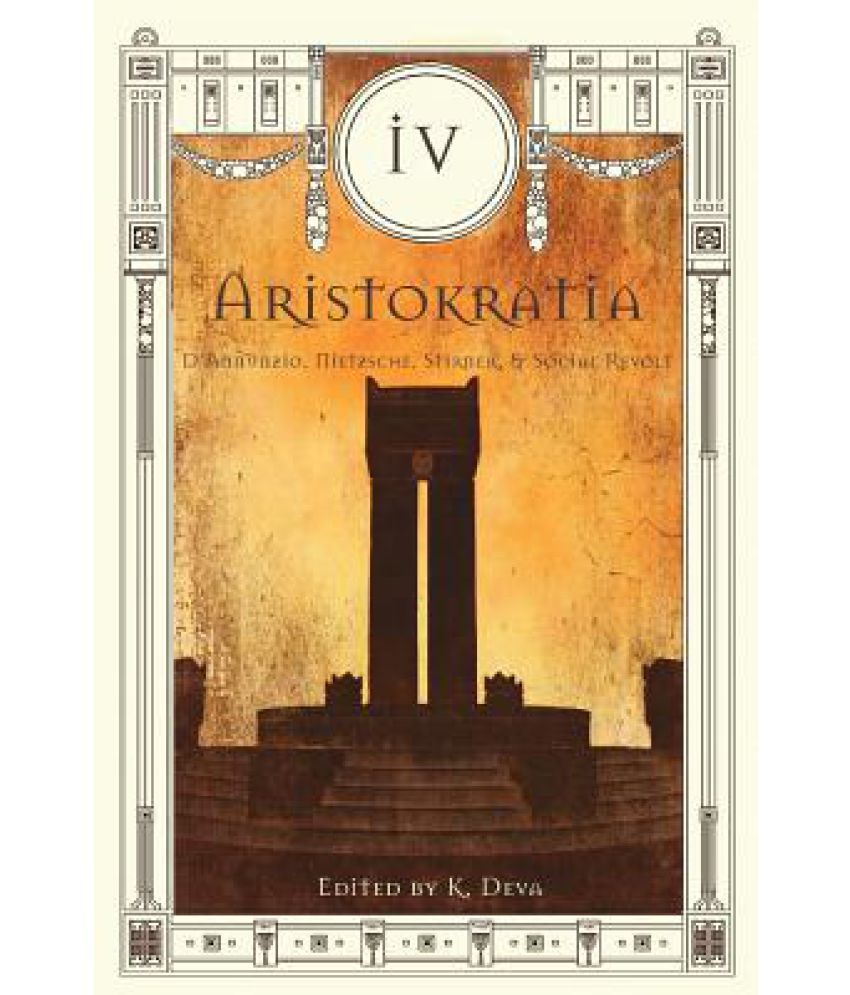Something went wrong. Please refresh the page and try again.
Something went wrong. Please refresh the page and try again.
Notifications can be turned off anytime from settings.
Item(s) Added To cart
Qty.
Something went wrong. Please refresh the page and try again.
Something went wrong. Please refresh the page and try again.
Exchange offer not applicable. New product price is lower than exchange product price
Please check the updated No Cost EMI details on the payment page
Exchange offer is not applicable with this product
Exchange Offer cannot be clubbed with Bajaj Finserv for this product
Product price & seller has been updated as per Bajaj Finserv EMI option
Please apply exchange offer again
Your item has been added to Shortlist.
View AllYour Item has been added to Shopping List
View AllSorry! Aristokratia IV is sold out.


You will be notified when this product will be in stock
| ||||||||||||||
Brief Description
The period of the 19th - 20th century produced rapid changes in culture, technology, and political thought. From the aristocratic radicalism of D'Annunzio and Nietzsche, though to Marx, and the extreme individualism of Stirner, the time was ripe for revolution. It is against this background that Aristokratia IV is set.
Learn More about the Book
The period of the 19th - 20th century produced rapid changes in culture, technology, and political thought. From the aristocratic radicalism of D'Annunzio and Nietzsche, though to Marx, and the extreme individualism of Stirner, the time was ripe for revolution. It is against this background that Aristokratia IV is set. Gabriele D'Annunzio: Nietzsche, Politics, and the Ubermensch in Italy Gabriele D'Annunzio is one of history's most fascinating characters. The majority of his writing is no longer available in English, but his influence over modern political history is without parallel. D'Annunzio was influenced by the philosophy of Friedrich Nietzsche and captured Fiume with the aid of the Arditi, who were referred to as D'Annunzio's 'dark seraphim of the apocalypse'. Nietzsche: The Physician of Culture During March 1873, Friedrich Nietzsche wrote a letter to Erwin Rohde, telling Rhode that he was thinking of naming a book The Philosopher as the Physician of Culture. In regard to this statement, there can be little doubt that Nietzsche believed his work would heal some of the ailments afflicting Western culture. Psycho-history, Physiology, & Social Revolt Does psycho-history define political ideologies, and to what extent? Psycho-history is a relatively new scientific synthesis, largely developed from the works of Lloyd deMause. Shuster wrote of the psycho-historical significance of ailments, commentating that Karl Marx's theories of alienation developed during the writing of Kapital, when he was suffering hidradenitis suppurativa. Max Stirner: The Consummate Individualist The Individual and his Property is the most important work by this incendiary German thinker and it unjustly fell into oblivion for a while. With this work Stirner threw down the gauntlet to the entire public; the churches, parties, governments, social revolutionaries, and "idealists." Ontological Historicism We think of history as a timeline, as a series of events extending a few thousand years into the past leading up to a vaguely defined point in time known as the present. Worse yet, it has become the habit of contemporary historians to assert that in some bizarre act of teleology that History, in its absolute sense, is proceeding towards a vaguely defined ontological end. Magick for Housewives: The Thought of Neville Goddard Why on Earth have you not heard about Neville Goddard before? In Neville, New Thought found its Alan Watts: a self-taught mystic whose tall, handsome, charismatic, British-accented presence thrived on the then-cutting edge audio-visual lecture circuit. The Idea of the Centre The idea of the spiritual centre can be found in many different traditions. All studies confirm its remarkable prevalence and antiquity, to the extent that we cannot reject the assumption that is universal. The idea of the centre reaches its highest meaning in the Indo-European traditions. From Heroes to Under Dogs In consideration of the decline of man, there is perhaps no greater example than in literature to show the fundamental transition from the aristocratic principle to the state of the common, the underdog, and the anti-hero. - Gabriele D'Annunzio: Nietzsche, Politics, and the Ubermensch in Italy [Gwendolyn Taunton] - Psycho-history, Physiology, & Social Revolt [K. R. Bolton] - Max Stirner: The Consummate Individualist [RenE Walter Pletat] - From Heroes to Underdogs [David MUller] - Homage to Zola [Louis-Ferdinand CEline] - The Idea of the Centre [Boris Nad] - Magick for Housewives: The Thought of Neville Goddard [James O'Meara] - Ontological Historicism [Lukas Kubena] - Nietzsche: The Physician of Culture [Gwendolyn Taunton] - Do Not Believe in Yourself [Jarrad Ackert] - Book Reviews
The images represent actual product though color of the image and product may slightly differ.
Register now to get updates on promotions and
coupons. Or Download App